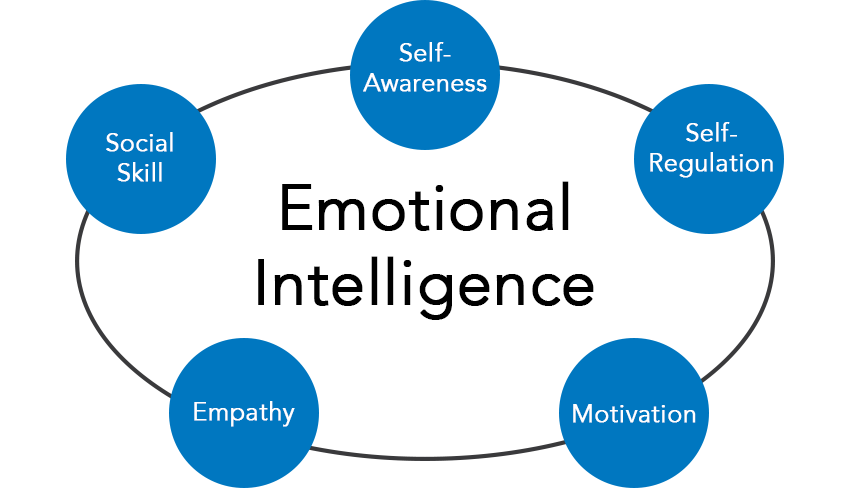Emotional intelligence is the capacity to be aware of, control, and express one’s emotions, and to handle interpersonal relationships judiciously and empathetically. It is often referred to as EQ, and while the concept has been around for many years, it really only came into play to the masses in the 1990s.
We as a society have been raised to analyze and make decisions from intellectual intelligence. In the past, emotions and intelligence were often seen as not compatible with one another. However, there has been a shift in recent years where leading researchers of psychology around emotions have seen how cognitive processes and emotions interact and influence the way we think. Emotions and moods whether positive or negative such as happiness or anger greatly influences how we behave, interact, and make decisions.
Emotional Intelligence: Why it’s important for success?
In 1995, Daniel Goleman’s book “Emotional Intelligence: Why it can Matter More than IQ” began to open the eyes to people about the impact emotions affect our daily decisions in life and business. He built a case how emotional intelligence played an important role with people’s success. This was even more evident when it came to business. Many business leaders soon began to see how this played a critical role in with employee engagement and interaction with customers. In addition,they saw how this played a role with managing stress and conflict along with performance in the workplace.
Studies were conducted and found that those with higher EQ level had higher interpersonal functioning, lower stress levels, and higher leadership abilities. It also led to better work performance and satisfaction in the workplace. Goleman cited that intellectual intelligence while an important attribute to leadership success was not alone the key indicator for success in the workplace. It required people having a higher level of EQ in conjunction with it. Emotional intelligence was recognized as an important attribute to all levels within any size business or organization.
While there are organizations and businesses that recognize the importance of EQ in the workplace, there are far more that are still ignorant to the concept. They logically know how it works but in reality do not implement or use it consistently on daily basis to build a successful workplace.
So why is Emotional Intelligence the Missing Ingredient for Success in the Workplace?
Key reasons are as follows:
- Those with higher EQ levels are more capable to controlling their emotions that do not affect communication or interaction with others. More interdependent relationships than co-dependent.
- Lead to better more sound decisions
- Better at resolving conflicts or preventing all together
- Have greater empathy for others and truly listen to understand versus respond
Emotional intelligence is widely recognized as a valuable skill, and it is also one that researchers believe can be improved with training and practice. While emotional skills may come naturally to some people, there are things that anyone can do to help improve their ability to understand and reason with emotions. This can be particularly helpful in the workplace, where relationships and business decisions often rely on interpersonal understanding, teamwork, and communication.
How to Increase Your EQ
You may ask is this something you are born with or can one develop the skill through practice. The answer is YES. While one’s personality and how they were raised plays an important role, it is a skill that you can develop over time with consistent practice.
Studies have shown that people who engage in daily practice with key emotional competencies showed improvement with their overall EQ. In addition to the emotional side, they also made improvements across the other eight pillars of wellness. They are follows:
- Physical
- Spiritual
- Financial
- Social
- Intellectual
- Occupational
- Environmental
So if you are interested in improving your emotional intelligence skills to benefit your workplace performance, there are a few things you can do.
Practice Self-Awareness
Becoming self-aware is a critical step to enhancing your emotional intelligence skills. It involves being aware of all aspects of yourself, including your emotions and feelings. It is one of the foundation components of emotional intelligence. Being self-aware leads to recognizing your emotions and feelings, then gaining an understanding where they come from within you. So, how can you improve your self-awareness?
- Learn to be present and recognize how you feel in the moment each day. How do these emotions influence how you respond? Do the things you are feeling have an impact on the decisions you make or how you interact with others? Being present and focused on these questions will allow you to become more aware of your own emotions and the role that they play in your daily life.
- Take ownership of your emotional strengths and weaknesses. How well do you communicate with others? Do you find yourself experiencing impatience, anger, or irritability often? What are ways you can address these feelings more effectively? Recognizing your weaknesses allows you to look for the solution to deal with them.
- Know emotions are fleeting and change quickly. Someone in your workplace may annoy you or your boss may be difficult to deal with on a task at hand. The key is to be aware and not react. Recognize that these situations are temporary, so making rash decisions based on intense emotions can be hurtful to your long-term goals and success.
Practice Self-Regulation
Daniel Goleman also identified self-regulation as an important part of the emotional intelligence process. While being aware of your emotions is an important first step, you also must regulate how you are feeling at any given moment. People who possess sound self-regulation skills are able to adapt well to changing situations. They do not shut down inside, but come back into the moment to find appropriate ways to express their emotions rather than just reacting to them. They are aware of how their emotional expressions affect others. So, how can you improve your self-regulation skills in the workplace?
- Implement activities to help you deal with workplace stress. Meditation, journaling, reading, walking, and physical exercise are all great examples as to healthy ways to offset stress.
- Keep calm when things get difficult. Always look for the solution rather than getting entrenched further into the problem. Take ownership for the priorities within your control and let go of the rest.
- Develop clarity by being present before making decisions. Emotions can overwhelm you in the heat of the moment, but you can make a calmer, more rational choice if you focus on being present that leads to clarity. It is through clarity we can see the bigger picture and the blessings disguised in the challenge to make better informed decisions.
Enhance Your Social Skills
Research on emotion psychology also suggests that people with high EQs also have strong social skills. They have the ability to recognize and relate to others emotions. In turn, they are able to communicate better and resolve issues in an interdependent way. Social skills are also highly valued in the workplace because they lead to a healthier more productive company culture.
Leaders with great social skills are able to build rapport with their colleagues and communicate their ideas more effectively. They make great team players creating an interdependent environment. So, how do enhance your social skills in the workplace.
- Relate and listen to understand versus respond. This means actively listening to others and relating to them to gain their trust. Active listening involves showing attention, asking questions and providing feedback. Use active listening to show you are passionate about work projects and willing to work with others to help the group reach its desired goals. In addition, be aware of other’s body language. Mastering the art of relating to others is learning to read body language and listen to understand other than what is said itself.
- Master your influence skills. Being able to carry influence in the workplace and empower others to draw their own conclusions will go a long way to improving your success as a team.
- Seek the solution and be open to ideas to better manage conflict. Focus on listening to what others have to say and look for ways to solve problems and minimize conflict.
Always Be Empathetic
People with higher EQs have the ability to relate well to others and respond either favorably to others emotions or neutralize potential conflict. It is seeing others from their perspective other than your own and responding again in ways that focus on the solution rather than aggravate the problem.
In the workplace, empathy allows you to understand different dynamics between others. It also allows you to recognize who holds power and how it influences the behaviors, feelings, and interactions that flow from such relationships. It simply creates an interdependent work environment that thrives to be more productive and efficient. So, how do you use empathy in the workplace?
- See things from others perspective. It can be challenging at times, especially if you feel like the other person is wrong. But rather than let disagreements build up into major conflicts, spend time looking at the situation from another’s perspective. It can be a great first step toward finding a middle ground between two opposing points of view.
- Make others feel important. Do you let them have a chance to share their ideas? Do you acknowledge their input, even if you disagree? Letting others known that their efforts have merit often helps everyone feel more willing to compromise.
Motivate Yourself from Within
Another key component of emotional intelligence is motivating oneself from within. People who have a strong EQ tend to be more motivated internally to achieve goals. They are driven internally because what they do or passionate about fulfills them at the core. They are not driven by external rewards first. External rewards are just the byproduct of their commitment to the process of serving their passion. They have a commitment to their work, they love taking on new challenges, and their enthusiasm can seem contagious. They don’t give up in the face of obstacles and they are able to empower others to work efficiently and persist in order to achieve goals. So, how to motivate yourself from within?
- Commit to the solution process from within your “Why”. Motivation sustains itself when we truly learn to be present. We commit to the priorities that matter first being laser focused in the moment. This allows us to be committed to the process rather than be tied to the end result or outcome. Being tied to the outcome itself can create unmanageable expectations and the tendency to become distracted by other less important opportunities.
- Be the positive example for others. Leading by example with a positive attitude in the workplace tend to inspire and motivate others as higher levels. Adopting this mindset can help you feel more positively about your work and encourage others to do the same.
Emotional intelligence plays an important role with striking a balance between work and personal well-being. Start today to take what you learned here to increase your emotional intelligence and begin making a difference in the workplace.
To your health & prosperity,
Christopher Salem







